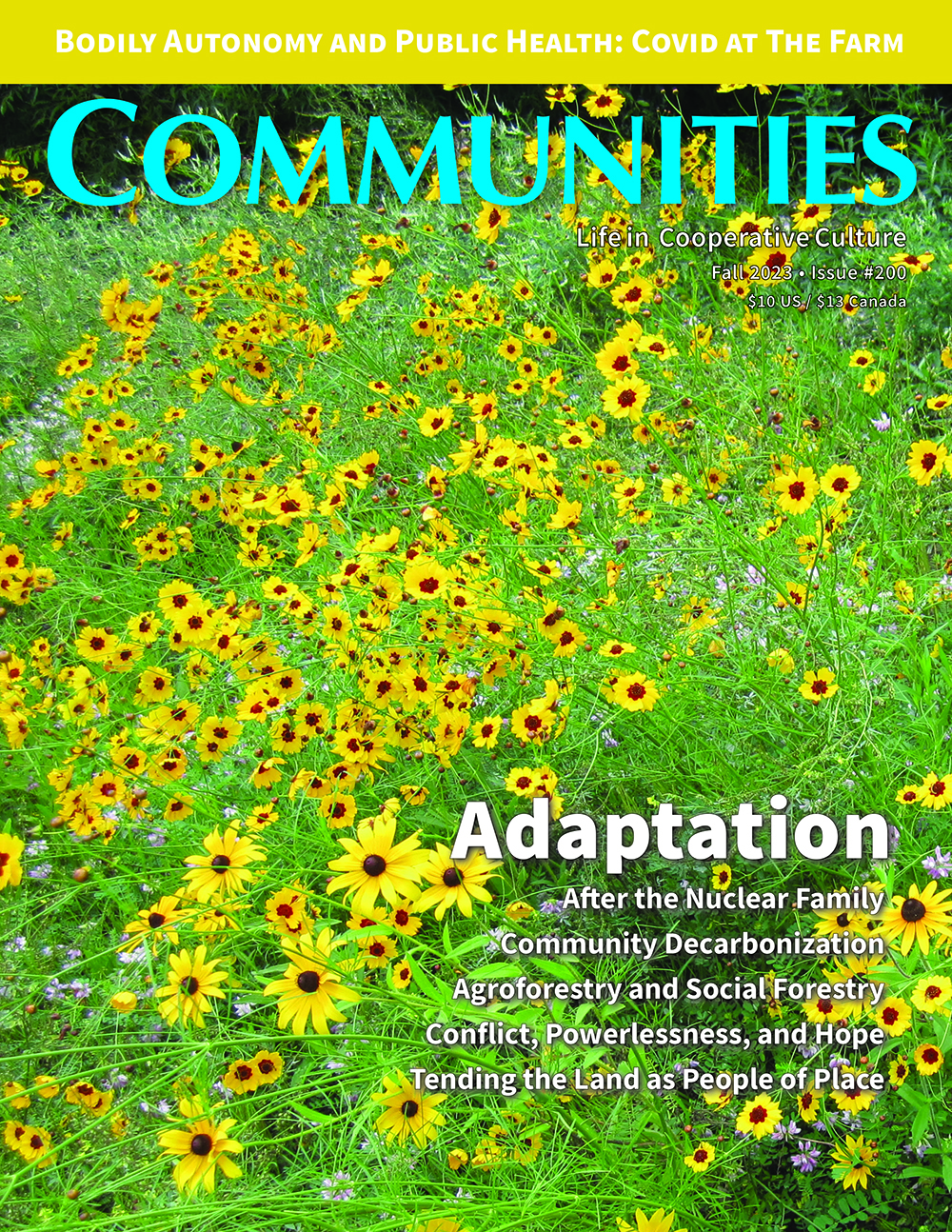
Communities #200
Fall 2023
Note: You can order a copy of this issue here.
Communities #200, Adaptation, explores how we as individuals, as groups, and as a species can adapt to changing circumstances, both internal and external. Articles describe experiences with social forestry, community decarbonization, dealing with conflict and evolving relationships, coping with loss and grief, new approaches to old challenges, and much more. It’s another rich, unique collection of stories related to our themes.
ADAPTATION
Letters: Coping with Bullies, Consider before Tossing, Anabaptism and Responsibility by Anonymous, Anne R., Roger Ulrich
Notes from the Editor: A Few Words on Adaptation by Chris Roth
A finger pointing at the moon is not the moon, but that’s no reason to chop off our fingers; they can help us adapt.
Contemplating the Honey Locust by Ben Brownlow
We often get some weeds in the cracks in our communities, and those weeds end up becoming the thorn trees that we always needed. There’s sweet honey in amongst the spikes and barbs; will we harvest it?
Trees for the Future: Agroforestry at Dancing Rabbit by Ben Brownlow
In this age and economy, the simple act of putting roots in the ground is an act of rebellion, if not hope. Let’s make a change for the better that’ll last a couple centuries.
Tending the Land as People of Place by Tomi Hazel Vaarde
First and foremost, we do forestry and Horticulture in groups of cooperators. To do this socially means to avoid both industrial methods (loud machines) and looking exclusively for a single product or raw commodity through extraction.
Adaptation and Resilience at Earthaven Ecovillage by Arjuna da Silva
Ours is not the only community that has tumbled and toppled through rifts and adjustments that came close to rending its basic fabric, and mine is not the only story about regrouping and redefining things.
Community Decarbonization in Ecovillage at Ithaca by Caitlin Cameron
What remains to be seen in this decarbonization process? How to convince 30 households to make a decision together to adapt to a future in which climate responsibility is imperative.
Covid Comes to The Farm by Michael Traugot
This perceived laxness about Covid came as a shock to many of us original members, who had lived through the polio epidemics of the 1950s and felt we were saved by vaccines. Our differences in perspective about Covid dovetailed with more universal generational conflicts.
Adapting to One Another in Community by Carolyn North
Adjusting to one another’s personalities and annoying habits, comfort levels and quirks, not to mention deeper psychological histories, is not so simple, but we can learn.
After the Nuclear Family: Fission, Fusion, Going Green, and La Cafétéria by Gabrielle Anctil
Environmental considerations, the crumbling of the nuclear family, isolation, the housing crisis…many issues find their solution in a more collective way of life.
Adaptation, Community, and Conflict by Freija Leeuwenburgh
Despite the challenges, being flexible and adaptable in situations of emerging conflict can be done very well while also remaining true to your or your community’s core values and ideologies.
Building the Life I Dream by Colleen
After jumping into the deep end of homesteading, it’s been a year of re-imagining the space in Mattie’s wake. First upon the bones of my failures and then upon increasing successes, my “sustainable haven” has come so far.
Finding Hope in the Face of Powerlessness by Sage Siera
I wish I could bring every crystal and stone back to that mountain, and I wish I could bring every shred of childlike wonder and safety, if it ever existed, back to those children, now gone.
Working Effectively with Especially Challenging Behaviors, Part Six by Diana Leafe Christian
Among other strategies, shifting to a modified form of consensus can make a profound difference in how a group’s especially challenging members treat other members and treat the community, at least in meetings.
The Promise of Social Forestry by Devon Bonady
Anyone wishing to live in a reciprocal relationship to the forest will appreciate not only the useful details from a wise and experienced elder but also the graceful and entertaining stories and spirit that Hazel shares.
REACH
Ecovillage Tales by Diana Leafe Christian
Creating an Urban Ecovillage: A Model for Revitalizing Our Cities by Jim Schenk and True to Life: Tales from an Ecovillage by Andrée Robert offer valuable insights from community founders.
ON THE COVER: Wildflowers grow at the edge of a constructed wetland off Morgan Street in Oberlin, Ohio. Until two years ago, this land was underwater, at the bottom of an old reservoir subsequently drained to create the wetlands. Photo by Chris Roth.
